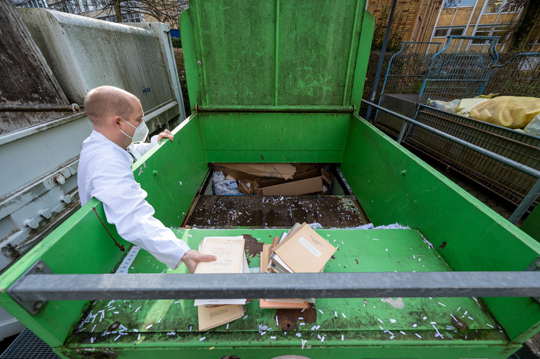Closing the Last Gap
Freiburg, Mar 02, 2021
What do a box of worms that transform biodegradable waste into fertile soil and a plan to replace all products at the University made of cellulose with 100 percent recycled material have in common? These projects are just two of the winning ideas in a competition initiated by the University of Freiburg and the Office of Student Services (Studierendenwerk) Freiburg-Schwarzwald at the end of 2020, asking students for ideas on how to reduce waste.

The University of Freiburg uses about 90 percent recycled paper. The paper baler helps to press paper into bales for recycling. Photo: Patrick Seeger
Some of the ideas are so obvious that you would think they have already been implemented long ago. For example, the idea that all of the departments at the University of Freiburg should pledge to use only cellulose products made from recycled material. Wait, don’t we have that already? Unfortunately, no. This was something that also puzzled Manuel Hoffmann, a 30-year-old trained pediatric nurse who is currently studying medicine at the University of Freiburg. Hoffmann has been interested in lumbering and its ecological consequences for a long time. When he heard about the competition, which was held as part of the European Week for Waste Reduction in November last year, he submitted an abstract on the “systematic replacement of all cellulose products with 100% recycled material.” As Hoffmann says, “Only a complete change will really protect the environment and help prevent more eucalyptus plantations from replacing the rain forest in South America while also protecting the last virgin forests in Europe.” He knows that recycling costs money, of course. “But this change is sorely needed and can be communicated in a positive way,” he says. Hoffmann won first prize in the “University” category for his suggestion, which should get things moving.
The Blue Angel is Very Popular
All of this makes Lora Gyuzeleva, the sustainability manager at the University and one of the co-organizers of the idea competition, very happy. “This way, we will hopefully succeed in closing the last gap in the foreseeable future,” she says, referring to the long history of the switch to recycled paper at the University of Freiburg. It started in 2006 and quickly became a success. The ratio of recycled paper went down to 50 percent after only one year, and it reached 74 percent in 2008. The overall use of paper continued to decrease each year. However, the project has since lost some of its momentum. Today, Gyuzeleva estimates that the ratio of recycled paper certified with the Blue Angel (a German certificate for environmentally friendly products) at the University is currently 90 percent. But this means that trees are still being cut down for the production of about eight tons of paper and cellulose each year. Is this acceptable? It wouldn’t be if the raw material for disposable napkins and toilet paper came from the Black Forest instead of Brazil. “People would certainly be very upset about that,” says Hoffmann.
Gyuzeleva and Hoffmann will be meeting with the Sustainable University Work Group to discuss how this idea can be implemented. The competition for ideas on how to reduce waste at the University and student dorms was an initiative by students in the Environmental Governance master’s degree program. Partner organizations for the competition were the zero waste shop Glaskiste, the University’s Office of Environmental Conservation, and the Office of Student Services (Studierendenwerk) Freiburg-Schwarzwald (SWFR). The fact that the majority of the submitted ideas concerned the student dorms, which are managed by the SWFR, does not surprise Gyuzeleva. “There’s a greater potential to avoid waste in a residential environment, where it’s often easier to implement,” she says.
Waste-Munching Worms
First prize in the dorms category went to Lena Wallstein and Emma Gasafi. The two students have only been studying in Freiburg since the fall of 2020 but were surprised to find out that the only place to dispose of their biodegradable waste in their dorm suite was the household waste bins, because of recurring problems with rats and other vermin in bins for organic waste. Wallstein and Gasafi wanted to change this situation.
After doing thorough research, they discovered that a worm farm would be “a clean way to reduce household waste while transforming biodegradable waste into fertile soil.” The worm farm is a box of worms that munch their way through raw vegetable waste, thereby transforming the waste into humus, which can be used for indoor plants, for example. Building a worm box can be a very creative activity. Some people use old wood pallets, others old car tires. Wallstein and Gasafi are currently discussing with the Office of Student Services about how their idea could be implemented as effectively as possible. In the meantime, they have been asked to contribute to a composting workshop. The competition was a great success with altogether 20 submissions says Gyuzeleva, who is already thinking about a second competition.
Dietrich Roeschmann

